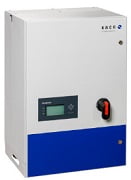New Reactive Power Inverter for PV Systems and More
Press Release
The blueplanet 50.0 TL3 RPonly from KACO new energy serves yield protection in solar parks and grid management.
Neckarsulm, 11. October 2017 – In order to support grid stability, German PV specialist KACO new energy introduces the blueplanet 50.0 TL3 RPonly. This unit can feed in reactive power at any time in order to maintain the grid voltage in the specified tolerance range – a key contribution to grid management. To date, no other manufacturer is taking this approach using a stand-alone reactive-power inverter, which can reduce the load on the solar inverters and prevent yield losses in the solar power plant.
When there is a lot of sunshine, solar parks feed large amounts of energy into the grid; when there is less sunshine, they naturally feed in considerably less and grid impedance can fluctuate accordingly. One useful means of compensating for the resulting fluctuations in the grid is to provide what is known as reactive power. This is where the new blueplanet 50.0 TL3 RPonly comes in: this AC-coupled inverter from KACO new energy enables operators of solar power plants, or transport networks, to provide the necessary amount of reactive power correction, by day or by night.
The correction value applied at the grid connection point is the crucial factor. This is where the park control system “reads” the measured reactive power. If the measured value deviates from the set-point – which can be set to any value between 100% active and 100% reactive – the blueplanet 50.0 TL3 RPonly inverter or inverters will be requested to supply reactive power to the extent that is required to arrive at the target value once more. Since fluctuations in the grid can result from a range of causes, the application goes beyond solar parks: the blueplanet 50.0 TL3 RPonly can therefore also be used for reactive power compensation in industrial or other large consumer sites.
Reactive power is defined using the phase offset between current and voltage, and is given as the cosine of the angle difference: if the current and voltage are completely in phase (phase angle Phi = 0 degrees), the cosine of Phi is 1, i.e. 100 per cent active power and 0 per cent reactive power is supplied. In contrast, if the current and voltage curves are completely offset (phase angle Phi = 90 degrees), the cosine of Phi has a value 0, so 100 per cent reactive power is supplied to the grid.
As a “phase-shifting” device, the blueplanet 50.0 TL3 RPonly can supply any value of reactive power between 0 and 100 per cent, current leading or lagging. The power is not given in watts (W) or volt-amperes (VA) but in var. As its name suggests, the inverter can supply up to 50 kvar.
By using the RPonly as a purely reactive-power inverter, solar inverters do not have to reduce their own active power in order to match the grid reactive power. Instead, they can continue to feed in solely active power, protecting the park operator from yield losses.
The blueplanet 50.0 TL3 RPonly can be used in new and existing plants, wherever reactive power is required in grid management, perfectly complementing solar inverters from KACO new energy or other manufacturers.

